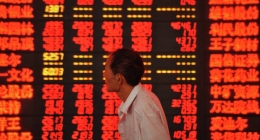The answer heavily relies on how the government of China will address its economy. Crisis will likely get closer to happen if the government do nothing over what is going on today. But Beijing has previously said that it intends to move the debt fueled recovery model, though there should be a real action to prove this rhetoric.
One of the ways that China can do is to make a shift upon its economical growth basis from investment to consumption. The key of the problem here is that China has been relying its economic growth on investment which is now turning to be unsustainable and exceeding the capacity. What China needs are better, and actually less, investment and more consumption-led growth models. Progress has actually been made, but it was still limited. Investment percentage from GDP has slightly fallen from 47% in 2011 to 46% in 2014. However, China has a long way to go since household consumption is still below 40%.[9] Moreover, there is a limit over how fast a country can shift its growth source basis. It is not easy to shift real resources among sectors. For example, if China decides to lower down its construction industry, it will take time for China to divert construction workers into other sectors.
China can also take any monetary policy to curb down the credit boom. One of the ways is to control financial repression, a term that refers to the concept of setting savers return under the inflation rate to enable banks to provide cheap loans to companies and governments. Financial repression has attributed to China’s economic growth for financing its investment. It has also dampened consumer spending since smaller return makes it harder for people to spend more, making the share of household expenditure accounts smaller to the GDP. Avoiding financial repression will enable China to curb down its credit boom, control the level of investment, and stimulate more consumer spending to increase household expenditures share of GDP.
One thing is for sure, the longer China delays to take action regarding this, the more severe the potential consequences will be.
oleh: Anas Izzuddin | Ilmu Ekonomi 2016 | Trainee Divisi Kajian Kanopi 2016
Footnotes :
- http://www.bbc.com/news/business-37403363
- http://data.worldbank.org/indicator/NY.GDP.MKTP.KD.ZG
- http://www.economist.com/news/special-report/21697983-china-needs-free-up-its-financial-system-even-if-it-hurts-says-simon-rabinovitch-big
- http://www.investopedia.com/terms/b/baddebt.asp
- http://www.economist.com/news/leaders/21698240-it-question-when-not-if-real-trouble-will-hit-china-coming-debt-bust
- http://www.aljazeera.com/programmes/countingthecost/2016/09/china-debt-160924081946832.html
- http://mobile.abc.net.au/news/2016-05-24/chinese-banks-1.7-trillion-debt-time-bomb/7439844
- http://www.worldbank.org/en/publication/gfdr/background/banking-crisis
- https://www.project-syndicate.org/commentary/china-leaders-debt-dilemma-by-adair-turner-2015-11
Related Sources :
- http://www.bbc.com/news/business-37404838
- https://www.youtube.com/watch?v=KJoRTTciPf0&list=PLd25R7cp2PcfuccRDPgbqXBvBD9Xjvi9R&index=2
- http://democracyjournal.org/magazine/36/the-coming-china-crisis/
- https://www.youtube.com/watch?v=gCzZEth8uNA&index=3&list=PLd25R7cp2PcfuccRDPgbqXBvBD9Xjvi9R
- https://www.youtube.com/watch?v=7enlEd_1XP4&index=4&list=PLd25R7cp2PcfuccRDPgbqXBvBD9Xjvi9R
Baca konten-konten menarik Kompasiana langsung dari smartphone kamu. Follow channel WhatsApp Kompasiana sekarang di sini: https://whatsapp.com/channel/0029VaYjYaL4Spk7WflFYJ2H







